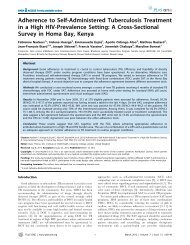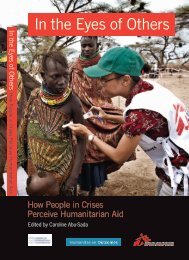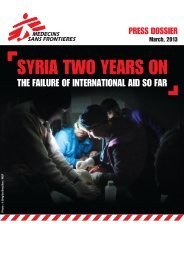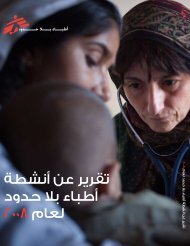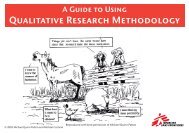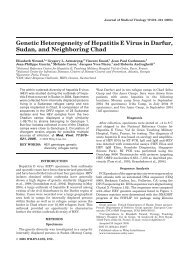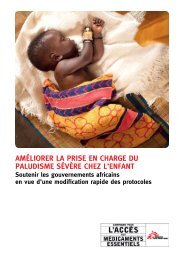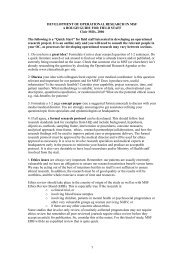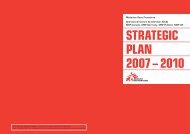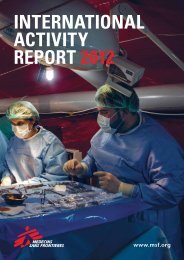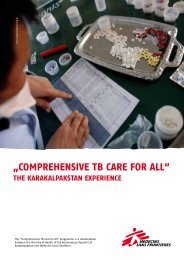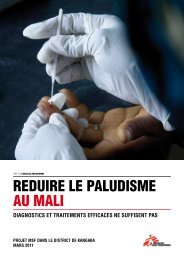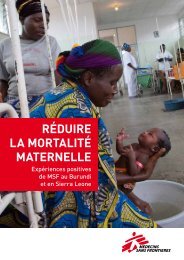Field - MSF-Holland Association - Médecins Sans Frontières
Field - MSF-Holland Association - Médecins Sans Frontières
Field - MSF-Holland Association - Médecins Sans Frontières
- No tags were found...
Create successful ePaper yourself
Turn your PDF publications into a flip-book with our unique Google optimized e-Paper software.
july 2011 - N° 37GUPAassociated for actionINTernal msf newsletterGA FeedbackDossier:Psychologicalfatigue<strong>Field</strong>the magic of <strong>MSF</strong>is the log,Liberia,Artesunate,better thanquinine8, rue Saint Sabin 75011 ParisSite ASSo : www.msf.fr/asso - Login : msf - PASSword : asso
Excerpts fromthe President’sAnnual ReportThe following article is basedon several excerpts from theAnnual Report, which reviewsthe major events from 2010 - 2011.We hope you will read the entirereport.From the earthquake in Haiti to the revolts inthe Arab countries and the measles andcholera epidemics, 2010 and the beginning of2011 were extremely rich in eventsinternationally. Most of them had a majorimpact on our operational activity.Currently, <strong>MSF</strong> is called upon to respond to emergencies ofall kinds throughout the world, which is obviouslychallenging our ability to respond to them. All of our teamsare employed in this and I would like to take thisopportunity to highlight their efforts.In 2010, the number of departures into the field increasedby more than 25% compared to the previous year. Itculminated at 2,300, a figure that we have already reachedover the first six months of 2011. The situation is just asstretched with our colleagues in the other operationalcentres.But we have carefully looked around us and we don’t seemany other organisations to take over the operations thatwe are carrying out in these emergency situations.Unfortunately we are approaching the moment - andperhaps we are already there - where we can no longerhandle this exponential growth. There will therefore besome choices to be made, some renunciations that wemust collectively make.It is far from being my intention to favour operationalreduction, as has been the case in the past, at the time forfinancial reasons.However, I want us to be able to carry out our missions incomplete security, fully aware of the risks that we have toface. (…)Rest assured, I am not only promising you «blood andtears»! On the contrary, I think that the current situation isquite encouraging because it highlights our ability to reactto the diversity of humanitarian crises that simultaneouslyaffect several population groups. Several years ago, wewere overwhelmed with a feeling of impotence concerningthe difficulties that we had in intervening, particularlywithin conflict zones.Looking back at a significantunderTAking: Ivory CostAt the beginning of this year, we also carried out a majorintervention in the war zone in Ivory Coast. In Abidjan, atthe end of 2010, in a post-electoral context that was highlypolarised, our teams managed to create a genuine area ofwork. From the beginning of the civil war, they have hadaccess to victims of the conflict and have taken charge ofemergencies, the frequency of which have only increasedas the situation in the town deteriorated: access difficulties,desertion of medical personnel in the main healthorganisations and drastically limited supplies of medicines,particularly due to the economic sanctions imposed onLaurent Gbagbo’s regime by the International Community.At the height of the war in Abidjan, in the hospital ofAbobo South, our team continued ceaselessly to receive thewounded, in spite of major difficulties in movement andthe fact that it was enclosed in the hospital with nopossibility of being resupplied with equipment andmedicines or of being relieved, under the threat of fightingin the immediate environment of the hospital. We mustpay tribute to the courage and perseverance of this team,which continued to provide treatment under theseconditions: during April, more than 1,000 patients werehospitalised in emergency and 312 surgical operationswere carried out.In the west of the country, the fragile equilibrium ofcohabitation between the different local communitiesquickly shattered, leading to population flight andmovement within and outside the country. Our teamsintervened to help these displaced people and again foundthemselves in the middle of fighting, during the offensiveby pro-Ouattara troops in mid-April. In the horror of thesefew days, the members of the team at Douékoué, deprivedof contact with the outside world, did everything in their2
LiberiaFIELDNews fromLiberiaMassieta was admin in Liberia from <strong>MSF</strong> France. She then worked for the Norwegian RefugeeCouncil as a consultant, and is now working on her thesis.Why are you a memberof <strong>MSF</strong>?I still feel a part of what <strong>MSF</strong> is doing,and I think <strong>MSF</strong> has a focus. Theybuild a team that even if you leave orif they leave, you still feel a part ofwhat is going on. Because it’s like yougrow up with <strong>MSF</strong>.There are still around15 members in Liberia,do you often meet?There are a few members, and wemeet. Presently, Francis Saba is ourfocus person. He makes sure themembers come. Every time we meet,we share many memories - especiallyme, because I was doing the salariesand the contracts, so I know a lotof them by name. So every time wemeet, it’s <strong>MSF</strong>.What is left of <strong>MSF</strong>in Liberia?The trademark is <strong>MSF</strong> has done a lotof training in all areas, there was alot of capacity built, so even if peoplego, like the nurses, they still go withthat. People rather take them becausewhen they see <strong>MSF</strong> in a CV, they knowthe capacity <strong>MSF</strong> has built in them.The nurses are still good, the staff isstill good. They know what <strong>MSF</strong> gavethem.Do you think there is stillsomething for <strong>MSF</strong> to do inLiberia?<strong>MSF</strong> France, since their point isemergency, we can’t say we hopethey come back because it wouldmean the crisis is coming back to us.If they have another approach, thereare things they can still look at. Butfor now, I think there are more countriesthat are in need of <strong>MSF</strong> than Liberia.As much as I would like <strong>MSF</strong> todo something, I think the resourcesare more important in the countriesthat are really in need.How is life nowadays inLiberia?Life is improving, basic public serviceis improving, but jobs are hard to findbecause of a lack of capacity. But forthose who have the capacity, the jobsare there. nPeople rather take them becausewhen they see <strong>MSF</strong> in a CV, they knowthe capacity <strong>MSF</strong> has built in them.The nurses are still good, the staff is stillgood. They know what <strong>MSF</strong> gave them.11
DOSSIER PSYPsychological FATIGueWe debrief with operations, medical department, hr, communicationdepartment. but emotions, painful experiences, stress at work:when are we talking about this? with whom and how? whether youare returning from a first mission, whether you’re an experiencedexpatriate or a national staff member caught in a difficult situationthat involved a security incident or just because working for <strong>MSF</strong> isn’talways easy, the need to improve support for <strong>MSF</strong> staff is becomingincreasingly clear. But the organization isn’t always eager to“send shrinks everywhere.” “We’re not here to treat every littleboo-boo,” some say. Nicolas, Pierre-Alexis and Natalie, all threepsychologists, recount their experiences on the ground and explainwhy it is important to give more attention to this issue.14
DOSSIER PSYa feeling of emptinessand failure. <strong>MSF</strong>’s responsibilityis to listento this, to determine, ifneed be, if the person canbe helped, and to give somemeaning to the end of a complicatedmission. Following that,we don’t have the responsibility ofensuring from A to Z the psychologicalfollow-ups of the person who hasreturned from the field.Is the “place to talk”frequented?It was implemented with a completelyrespectable will to not forcepeople to go there if they didn’t havethe need. This wasn’t lost on anyone:people didn’t go there at all, in thebeginning. It took a lot of time beforesome people saw its value. Workingin the HR department, I saw a discrepancyin what I heard in the hallwaysand the amount of visits to the“place to talk,” which wasn’t a placefor psychoanalysis or psychiatry. Ithink there is a fear of all of that, acertain stigma: going to see a psychologistshows that we aren’t well,that we couldn’t handle the stress of amission, and there is a certain officeculture that doesn’t easily recognize aperson’s right to help themselves at agiven moment and to talk about whatthey lived through in the field.At this time, you aredeveloping your protocols.What are you proposing?First, I want to launch this subject atthe headquarters. It is a topic thatpreoccupies much of RP and HR.There are no guidelines for stressmanagementthat say: “referyourself to page 28 when you can’tsleep, and you will get better.” Thisis a document of support that mustbe taken to every level of <strong>MSF</strong>, fromthe leadership to the nurse when shearrives in the field. If we talk aboutprotocol, there is prevention, sensitization,and manager training, in orderto help avoid burn out. Thistakes time for training. Next, there islong term assistance in the field: onemust be able to give recommendationsto the office and to help coordinate.And assistance upon return.This concerns people who are exhaustedand who need an audienceoutside of the office, we do not simplytarget those people who are inthe process of developing burn outsyndrome. Everyone has the right toa moment of escape. n17
DOSSIER PSY“In Large-scale field projects,a permanent therapist is needed”Pierre-Alexis arrived in DRC in March 2010 as a coordinating therapist: a therapist to bothsupport the teams and also coordinate the therapy project for victims of sexual violence.The job post opened in the beginning of 2009 after violence reignited at the end of 2008 to supportthe area demand.Why was a therapist needed for national staff?The situation was a source of great insecurity (armed conflictfor more than 15 years, armed gangs, crime). It is agrey zone: there was neither war, nor peace. Our employeeswere at risk due to their economic situation and socialstanding. For example, I had to intervene in Rutshuru onbehalf of the nurses and guardians who were held up intheir homes during the night because they were known tobe working for <strong>MSF</strong>. At the beginning of the month, justafter payday, there were attacks on the areas where <strong>MSF</strong>employees resided.There was also workplace stress. The nurses, for example,are in extremely difficult work situations at the hospital.Due to the fact that when <strong>MSF</strong> was established in the hospital,we received surgical medical emergencies from allover. Nurses are therefore under tremendous professionalstress.Drivers are held up almost every month. In September2010, a driver was shot. In Nyanzalé, in October, severaldozen people attacked the <strong>MSF</strong> installations and beata member of the local staff. It seemed more and morethat we had a responsibility to care for the mentalhealth issues of our employees in the field.After several therapy sessions, they recuperate very well.But there can be people who were damaged long ago, andwho are hit again by some event. In this case, we are dealingwith different types of suffering, which require longermanagement. If someone suffers from serious depression,and we are not staying for a long time, we try to call onlocal resources. If any medication is needed and we haveto end the project, we must at least assure that there willbe a general practitioner by whom the person can be seen.We can find a therapist in a different NGO, we always findsome solution.Expats are transient, the nationalstaff remains. Does that changeanything in terms of care?This changes something at the psychologicallevel, first. Those who live for years in awar-zone, like in Kivu, develop psychologicaldefense mechanisms, both individually andcollectively. They barricade themselves offpsychologically, in order to feel less. They arevery affected, but they also have very strongself-protection.There are two types of care: a person wholived “normally” and enjoyed life, and experiencesan event that shatters the course of their life.In these cases, we perform an intervention in theweeks that follow, but this is short management.18
DOSSIER PSY“Haiti was shocking”Nathalie Lion went in mission in Haiti to support the national and expat teams juste afterthe beginning of the cholera outbreak.Why were you sent to Haiti?I was sent to support expats and nationalstaff teams. My mission wasnot very clear. After the first few returnedfrom mission, we realized thatpeople over there needed help.Did the demand come fromthe field?I don’t know if people asked. That’swhat makes our work with expatriatesunusual - there really is no demand.Sometimes, a person may behaving such a hard time or sufferingso profoundly that he or she is nolonger able to ask for help. So, instead,it was the sensitivity of peopleat headquarters that led us to say,“They absolutely need help.”We had the experience?The difficulty is always to assess theneeds on the ground. We work in contextsin which we are all tested. Thequestion is: At what point should wesend a psychologist? Is it a questionof work load, are people just workingtoo much? Or are people beingexposed to particular things that aredifficult to assess from Paris? Fromthe ground to headquarters, the needfor help is not always clear.We work in exhausting contexts, butit is out of the question to send psychologistseverywhere and for everything.It does not make sense. Wemust make assessments on severallevels and if there is doubt we willsend someone. It is like the questionof mourning in France, we may besuffering, but we do not need to seea psychologist necessarily. Similarly,we can overcome some difficulties asa team in the field - we do not needa psychologist every time and everywhere.We work in exhausting contexts, but it isout of the question to send psychologistseverywhere and for everything. It doesnot make sense. We must make assessmentson several levels and if there is doubt wewill send someone.In Haiti was it useful?We should ask the people I workedwith. What was particular in Haitiwas that nobody was able to helpothers. This is a clear sign that helpis needed. In an emergency situationlike Haiti, they need someone tocome because there is a lot of workand no time. As a psychologist, I arrivedwithout any clear operationalpurpose. I was not rushed to set upa CTC to save people. I was able toprovide the time and availability thatnobody else could provide. Everyonewas caught up in the daily emergencyneeds.What you are describingseems to be a question of humanresources, why wouldwe need a psychologist?There is indeed a part that falls underorganization and human resources.But there is also something uniquebecause Haiti was a shock to many inits confrontations with death, brutality,and <strong>MSF</strong>’s limitations. There wasmuch to do, we could not do everythingor go everywhere. These arethe types of things psychologists canhelp with.Specifically, how did you helppeople deal with those issues?By talking. I moved very quickly inthe field, offering one or several conversations.I focused specifically onthose I thought would be having themost difficulties, people who had arrivedat the beginning of the epidemicand first missions. Apart from theshock of cholera, death, and everythingthere is to do, there is also thediscovery of what <strong>MSF</strong> is.Did you feel welcome?For some there was hesitation at first,“I don’t need a psychologist, I havenothing to say.” But eventually therewas less resistance and more relief.20
DOSSIER PSYThere is indeed a part that falls under organizationand human resources. But there is also somethingunique because Haiti was a shock to many inits confrontations with death, brutality, and <strong>MSF</strong>’slimitations.You write in your report thatthere was no post traumaticsyndrome. Was there a specificneed to be able to unburdentheir emotions?This is especially the case for nationalstaff for whom things went better. Butsome expats were traumatized. Essentially,this became an opportunityto recognize that there are woundsand to make sure they do not becomeinfected.Is there a need to follow upwith expat staff once theyreturn home?There are two cases: people who sufferon a mission because of thingsrelated to the mission - once it is developed,one or two interviews canbe an option upon return. And thenthere are situations where what yousaw on a mission awoke things - oftenaround the question of death. In thiscase a psychologist may be necessaryupon return, not necessarily in thecontext of <strong>MSF</strong>. This is a personal endeavorand will take time. Situationslike this happen when we arrive inthe field with our bags a little heavy.Bags are not emptied on mission. n21
DOSSIER PSYTémoignage:“A place to speak is not enough”Testimony from an expat returning from Gaza. “Headquarters did not acknowledge the magnitudeof the impact of this war on the team.”“The Israeli operation in Gaza from12/27/2008 to 01/18/2009 was especiallyviolent (1400 deaths and 5000 wounded),intense, and long if we consider thatbombings almost never stopped duringthe entire operation. Most of the time, people living inGaza did not get any relief.Much of the coordination team stayed in Jerusalem duringthis period, we debriefed the team on the site constantly.The decision I made (it was an agreement with the teamand Paris) to make three expatriates return to Gaza (wewere convinced it was the right decision, I am still convincedtoday), this decision was made knowing it would beextremely difficult to go out. We were in Jerusalem, powerlessto manage the safety of the team in Gaza. Quickly,after a week of conflict, the decision was made to relay theteam of expatriates in Gaza. But the safety conditions didnot allow us to do it before the 01/17/2009, the day beforethe cease-fire.To provide some relief to the coordination team and supportthe team on site, the ‘’psy’’ coordination set up a hotlinethat the staff could call for debriefings. There wereonly a few calls. On both sides, people prefer to call eachother. My calls with the <strong>Field</strong> Co never stop and only increased.As soon as the conflict ended a debriefing for the nationalstaff was organized by an Egyptian psychologist who couldreturn to Gaza. It is very difficult to estimate the impact ofthe debriefing on a population who has had to deal witha conflict for years. They cannot go somewhere else to getrelief.Nothing serious was done for the expats. A session of debriefingwas done for the <strong>Field</strong> Co and nurse (an expatriate)with our Israeli psy. The MedCo who stayed in Gazafor operational reasons, was offered a debriefing only 10days after she came back from Gaza. For the coordinationteam on site in Jerusalem, nothing was done.The coordination team who is stronglyinvolved in the sharing of stress, cannotimpose tough decisions about the exitof teams and the entire operational chain,this includes the emergency desk.It is in a conflict between the operationalanswer and the psychological supportof the team. Of course, the operationalanswer is the most important, it is our job.From the end of the conflict,the emergency operation, withreason, is a priority. The followingweeks were devoted200% to operations with theemergency desk. Gradually, therelationships within the coordinationteam and the team inGaza deteriorated, groups appeared.At one point I thoughtI could not manage this situation,I thought the point ofno return was reached. Twomonths after the end of theconflict, 3/18/2009, I askedfor the support from Paris tomanage the conflict, that, accordingto me, jeopardize ouroperational efficiency.22
DOSSIER PSYI have to say that, between the 12/27/2008 and the03/18/2009, the day when I asked for help, as the Headof Mission, I never got a phone call from the DRH or themedical department, worried about the psychological situationof the team. During the conflict, it seems logical, butafter the conflict I do not understand this behaviour.I think headquarters did not acknowledge themagnitude of the impact of this war on the teamThe proof is in comparing the level of violence here andin others areas, minimizing the importance of the traumahere.The support of the team can only be done by the Headquartersand by an external structure to the OP. The fieldstaff affected by the violence cannot really ask for strongsupport, it is obvious. The coordination team who isstrongly involved in the sharing of stress, cannot imposetough decisions about the exit of teams and the entireoperational chain, this includes the emergency desk. It isin a conflict between the operational answer and the psychologicalsupport of the team. Of course, the operationalanswer is the most important, it is our job .I think we should question the efficiency of a ’’place tospeak” as a proposal of support. At the end of the missionin Chad, after many safety incidents, especially in Koukouin 2007, I left instead of using the “place to speak”.I thought that some rest would be enough. <strong>MSF</strong> did notfollowup with me after I went home. n”<strong>MSF</strong> needs you !!!The publisher, Éditions Kirographaires, want to produce a collection of “personal accounts”from <strong>MSF</strong> volunteers and national staff in conjunction with <strong>MSF</strong>’s 40th anniversary.Have you had one or several experiences in the field that have changed you and that were particularly meaningful?An encounter, perhaps - with a person, a country or a situation? An anecdote, but a powerful one, that’s part of <strong>MSF</strong>’s“history with a capital H” – or that comes from some forgotten place? We want to hear from you!If you’ve already written about it, please send us your account (between 2 and 15 pages). We can also work with youon your piece or even record your story.For further information, please contact:Hélène Renais06 07 31 73 01 – helene.renais@edkiro.fr23
High speed internetin the field!Deane Marchbein, <strong>MSF</strong>-USA vice-president, campaigns for high speed internet on all <strong>MSF</strong> projects.You push for high speedinternet on every <strong>MSF</strong>project, what would bethe added value?The first thing is individuals gettingthe information that they need. Thesecond thing is headquarters gettingthe information they need to makesense of what people are doing in thefield.If you want to change the way careis given in the world beyond a simpleproject in <strong>MSF</strong>, you need to havedata. The internet would help withdata collection. You can say a telephonedialup modem would do, butI’ve been in projects where the modemwas down so often that peoplewould have to enter and re-entertheir data so many times because itwould be lost, and that is very frustrating.The third thing is that sometimes,there are complex and difficult problemsthat you want information aboutfrom colleagues who have dealt withthe same thing, or who know a lotabout the subject. You know the flipsideis going to be that we don’t wantpeople to get outside of <strong>MSF</strong> guidelines,because they are going to bedoing things that they shouldn’t bedoing. But I think it brings new ideasthat you can take back to the medcoand the fieldco.24
Is this something you’veexperienced?I was in a project in the DRC, wherea patient was carried after having amassively botched ceasarian section.She was weighing 39 kilos - this wasa tall adult woman. She had so manydraining fistulas that you couldn’t justrepair one of them. She was able toabsorb absolutely no nutrition. Shehad gone back to where she had hadthe C-section and they basically senther home to die. So she came to <strong>MSF</strong>hoping that we could do somethingmore.From an anaesthetic and surgicalpoint of view, she presented a hugerisk. So we tried all kinds of things.Finally, the surgeon used the highspeedinternet that was available; shewrote to a number of colleagues whohad lots of experience in very technicalthings and also who had workedin Third world countries. Mergingthis information and going back tothe referent medco, we started treatingher infections, treating her malnutrition,and basically getting herto the point where she could survivesurgery.We took her to surgery, but withoutthe reinforcement from outside I’mnot sure we’d have gone through theseries of steps that we did to make itfeasible for her to survive the surgery.Some people would say it’snot <strong>MSF</strong>, because in the fieldyou have to be tough andconcentrated on what you’redoing.What was <strong>MSF</strong> in 1971 were a handfulof doctors going into the field witha bag full of medicine able to do verylittle. Hopefully, we have evolved agreat deal. We went into Haiti afterthe earthquake, we were dealing withtrauma and complex problems; lookat us in Jordan dealing with the refugeesfrom Iraq, with serious and difficultmedical problems.The information in the world is evolving;why not give people in the fieldaccess to all of the tools that willmake them more effective? In myview, <strong>MSF</strong> seeks to be better and tobring quality care to people in theworld, why would you not want togive all the available tools to do that?Imagine that a person in Colombiaand a person in India who are workingin two very different contexts buton the same problem could communicatethrough internet, and share informationand ideas on how to betterdo their job, wouldn’t that be a wonderfulthing?There is a clear barrier betweenexpats and nationalstaff regarding access to information.Wouldn’t high-speedinternet allow the nationalstaff to get more involved inthe association?About the association, in the projectI was in, in Lubutu, there was a librarythat was opened when thefirst person arrived in the morningand closed when the last expatleft. There was a single laptopthat was available for anyone whodid not have their own and fourother cables for people who couldbring their own laptop to hook up.Because there was high-speed internet,it was available to all thenational staff, so it was a way ofmaking the associative accessible.I was in South Sudan in an OCPproject, where I was talking to peopleabout the association, and oneof the national staff brought me thisslip of paper and said two yearsago, he applied to be a member ofthe association, and no one ever gotback to him. There, they couldn’teven ascertain basic informationlike who was the president of <strong>MSF</strong>.Do you have an idea ofhow much it would cost?Would you say that whateverit costs, <strong>MSF</strong> should do it?I’m not one to say “whatever it costs”.My understanding is it would bearound a couple thousand a monthper project. That may sound like alot, but in my view it’s a basic tool ofour current society. I think <strong>MSF</strong> triesvery hard to be a good and responsibleemployer, and in my view, providingaccess to relevant information ispart of that. n25
The InternationalCouncil is dead- long live theInternationalGeneral Assembly !The last meeting of the International Council as currently constituted – composed of the 19presidents of the 19 <strong>MSF</strong> sections - was held at the end of June. Its most important decisionwas to approve <strong>MSF</strong> International statutes. The first International General Assembly willbe established in December. It will include two representatives from the existing associationsand will be open to future <strong>MSF</strong> entities that ask to join, assuming they meet the criteriaspecified in <strong>MSF</strong> International’s statutes. Unni, the president of <strong>MSF</strong> International, reviewsthe results of the IC.Dear fellow <strong>MSF</strong>ers,Thank you all for attending the last IC meeting, in-person or on-line, whatever the case may be. This threedaymeeting in Geneva marked a key moment in the evolution of <strong>MSF</strong> as a movement. With strong supportfrom the field and from your associations, concrete steps were taken to implement the reforms that we havebeen working towards for the past two years.The IC adopted a comprehensive set of decisions and outcomes – these are available on our InternationalAssociative Website, so I will just mention a few.On the Inter-OC agreement, the IC expressed its concern at the current status quo, and requested a clearstatement and a proposal on the way forward from the Excom. It also called the executive to have a more indepthlook at complementarities and overlaps in the OCs’ operational plans. Besides, the IC encouraged themovement to be more proactively engaged in preventive nutritional strategies, and it agreed to continuesupporting DNDi.Of course, the major achievement of the meeting was the final adoption of the Statutes and Internal Rules of<strong>MSF</strong> International. The new Statutes of <strong>MSF</strong> International were voted in unanimously and as a result the IChas been dissolved! Later this year, <strong>MSF</strong> will convene its first ever International General Assembly – whichwill be a larger and more inclusive gathering. This assembly will coincide with the 40th anniversary of themovement and will take place in Paris from the 16th to the 18th of December. Please note the dates and welook forward to your participation, be it physically or virtually!The entry into force of the new Statutes puts an end to a two-year long, sometimes painful, process aimed atreforming our associative governance so that it is both more open and more reactive. Again, the key goal ofthis change is to make our organisation more efficient in a continuously evolving context so that we remain arelevant and medically innovative actor and pursue our social mission the best we can. The reforms alsomean to improve our coherence and accountability, while preserving our decentralised operational functioning– as you can see from the preamble of the Statutes.26
The PAPES !!!SePT.2011ASAP- 1 HOM - Niger - Niamey - 12 months- 1 Deputy HOM – Yemen – Aden – 6 months- 1 HOM - Somalia - Nairobi - 12 months- 1 Deputy HOM – Haiti – Port au Prince – 6 months- 1 coordo explo - Somalia - Nairobi - 12 months- 1 coordo Lybia – Support hopital – 1 month- 1 emergency coordo - Yemen - 3 months- 1 medco – Colombia – Cali – 12 months- 1 deputy medco - Ivory Cost - Hospital support - 6 months- 1 medco – Haiti – Port au Prince – 9/12 months- 1 deputy medco – Haiti – Port au Prince – 6 months- 1 medco – Papoua New Guinea – Port Moresby – 12 months- 1 medco – DRC – Katanga – measles – 3 months- 1 medco - Yemen - Saana - 12 months- 1 epidémio explo - Kenya – Liboi nut - 1 month- 1 Deputy CP - Ivory Cost –IDPs hopital - 3 months- 2 CP nurse - Haiti - choléra - 6 months- 1 CP - Kenya – Garissa nut - 3 months- 1 CP med – Lybia – 3 months- 1 CP - Pakistan - Islamabad – 9/12 months- 1 CP – DRC – Kalemie –Choléra - 9 months- 1 CP - DRC- Puka - 6 months- 1 CP – DRC – Birambizo – 6 months- 1 CP nurse - Chad - vacci - 3 months- 1 CP nurse - Chad - cholera- 6 months- 1 CP log - Yemen - IDP – 6 months- 1 CP - Yemen - Aden - 6 months- 1 CP - Yemen - Ta’izz - 6 months- 1 CP construction – Haiti – St louis – 6 months- 1 watsan cholera - Haiti - Port au Prince - 3/6 months- 1 logco - Papoua New Guinea - Port Moresby - 12 months- 1 logco - DRC - Goma - 9 months- 1 deputy logco - DRC Goma - 6 months- 1 logco measles - DRC - Katanga - 6 months- 1 Deputy logco - South Sudan - Aweil - 6 months- 1 corh - Congo - Brazza - 9 months- 1 cofirh - Ivory Cost - hospital support - 3 months- 1 admin - Ivory Cost - Guiglo - 3/6 months- 1Corh - Iraq - Amman - 6 months- 1 admin – Haiti – choléra – 3/6 months- 1 admin terrain – Haiti – St Louis – 6 months- 1 admin – Kenya – Liboi – 3 months- 1 cofin– DRC – Katanga measles - 2 months- 1 corh– DRC – Katanga measles - 2 months- 1 corh – DRC – Lubumbashi – 2 months- 1 Admin - DRC - Puka - 3 months- 1 admin - Yemen - Amran - 6 months- 1 HOM - South Sudan - Juba - 12 months- 1 deputy medco surgeon- Iraq - Jordan - Amman - 12 months- 1 medco – DRC – Goma – 12 months- 1 coordo vacci measles – DRC – Katanga – 3 months- 1 emergency coordo nut – Kenya -- 1 CP nurse - CAR - Paoua - 6 months- 1 CP – China – Bejing – 6 months- 1 CP nurse - Colombia - Benaventurra TB - 12 months- 1 CP nurse - Ethiopia – Addis Abeba - 6/12 months- 1 deputy coordo – Lybia – Hôpital – 1/3 months- 1 CP - Mada - Bekily - 6 months- 1 CP nurse - Mali - Koutiala - 6 months- 1 CP med - Uganda - Arua HIV - 12 months- 1 nurse vacci/CM - DRC - Mukanga - measles - 3 months- 1 nurse vacci/CM - DRC - Malemba - measles - 3 months- 1 CP nurse - Chad - Malaria - 12 months- 1 logco - Kenya - Naroibi - 12 months- 1 logco - Ethiopia - Addis Abeba - 12 months- 1 logco - South Sudan - Juba - 12 months- 1 admin - Mali - Bamako - 12 months- 1 admin - Chad - Malaria - 5 months- 1 admin - Yemen - Sanna - 12 monthsOct.2011- 1 medco – Kenya –emergency nut – 1 months- 1 CP med – Burkina Faso – Yako – 9 months- 1 CP admin –choélra – 3/6 months- 1 cofirh – Palestine – Jerusalem – 12 monthsHQ- Logistic department director - Paris- Director <strong>MSF</strong> office - Dubaï- <strong>MSF</strong> Logistique responsible - Dubaï- Humanitarian Advocacy Coordinator - Sydney- Medical referent for the New York desk- Program manager desk Dubaï- Medical referent desk Dubaï- HRO responsibleFIND All The PAPES oN The ASSo webSITE29
OUCÉKISONT ?ARMenia/ Harjeet Bagga - Shahidul Islam - Giuseppe Muffoletto - Janthimala Price - Ji Hoon Baang - Sarah Alize Chauvet - CarmelMorsi - Yulduz Seitniyazova - Phoebe Balikagala - Alexandra Hoffmann - BuRKina FASo/ Sara Gaspani - Abdelkader Ghanes - JeanHereu - Marie Hortense Koudika - Lyubov Nisenbaum - Miren (Mirentxu) Amestoy - Mahaman Bachard Iro - Bertrand Lamy -Matthieu Screve - Abdel Kader Issaley - Car/ Anne Abrard - Olivier Aubry - Olivia Grauer - Andre Jincq - Sophie Laroche - HamidouOuattara - Moustapha Soumano - Bobo Banza Makoso - Mikaël Gilbert Pierre Bour - Dorothee Deslandes - Frederique Eygonnet -Frederic Granier - Obed Ibiliabo Bayan Fumu - Louis Albert Massing - Eric Mensah - Issa Moussa Moudi - Kpinzié Soro - AdamaToure - Morgane Bernard Harel - Kouassi Kouman - Christophe Konan N’dry - CHAd/ Mohamed Ramzi Benbaba - Frederic Ferrete- Hiba Gomri - Johanne Gourmelon - Rossella Hakim - Vanessa Mazelaygue - Anne-Julie Rolland - Gwenael Berranger - Abiol Deng- Kagayo Jean Luc Mungu Akonkwa - Jean-Philippe Olele - Jordan Wiley - Caroline Lutz - Paul Arnaudin - Jose Ngama Bafoa -Gianluca Ferrario - Adama Konate - Axelle Lemagny-Boc-Lonlaygue - Rachel Wing Yun Loong - Lisa Helena Rydell - China/ OlivierBlondeau - Gilles Isard - Christophe Lacoste - Helena Yaniv - Miu Fan Esther Yiu - ColoMBia/ Gilbert Bacherot - Oscar Danilo GarciaLinarte - Jeanine Gayraud - Jean-Marc Guyon - Nathalia Ruiz Martinez - Marie-France Bego - Pascale Bourdais - Janet <strong>Field</strong>s -Helen Lee - Isabelle Moc - Jose Gregory Mompel Navarro - Lindsay Moore - John Diego Sierra Torres - Rachel Joanne Creek -Guenael Le Personnic - Yolande Wolff Francos - Congo/ Olivier Brandner - Stephane Barde - Cathy Beuve - Pecory SouleymaneCoulibaly - Felix Dieles - Alberto Giudiceandrea - Kokola Kabengele - Hayley Suzanne Morgan - Pierre Nicolas Poget - Sandra Roy- François Charles Tehoua - Benoit Thirion - Carmel E. Martine Berret - Elsa Boudsocq - Bogui Heric Yann Diplo -Christophe Duhaut - Romain Gouy - dRC/ KouaoJean-Baptiste Bile - Majdouline Defouf - JessicaFarebrother - Primitive Gakima - Chantal FeliciteGamba - William Hennequin - Juliette Letanneux- Yorrick Moulin - Angele Mounier - Ettile Darius Ngoran - Iandy Albert Patureau -Emmanuel Viret - Barbara Barbieri -Celine Chamussy - Madge Destorel - MarieElicagaray - Remi Luthereau - Neida Matias Batista - Stephanie Meneghini -Marie Aude Picot - Nassingar Aintangar- Shushanik Baghdasaryan - Madi FouraSassou - Zinna Mezi - Yuchi Morimoto -Augustin Ngoyi - Chibuzo Okonta - EricPfeiffer - Karine Robert - Marie-Dominique Rogliardo - Francesco Sincich- Fiona Turpie - Geraldine Henner Epouse Degiron - Lyssandra Barbieri -Lien Bruggeman - Ronny Debersaques- Felix Dingituka Kamalandua - GezaHarczi - Abdourahamane Issa - Marie- Paule Cruells - Emmanuel Escaffre -Ouehepohi Gabriel Goulai - MicheleHervouet - Muriel Ibos - Jose Augusto DeJesus - Anne Cecile Lattes - Benjamin Maciow - Younous Mahamat Mokhtar -Caroline Massart - Aude Pierret - Nafartche Sami - Thierry Zammit - Andy Benhamou -Amaru Benoist - Orlane Callaud - Guillaume Clatot - Julien Delozanne - Celine Garrigues -Audrey Giraudo - Toe Jackson - Linda Kessy- Pauline Lethellier - Anne Stievenard - MarionTricot - Basile Baron - Germain Brion - Marc Bullock - Clair- Alain Georges Paul Courtade - Stephanie Gruttadauria- Moumouni Kinda - Virginie Long - Vanessa Lopez Lopez - Moudewhenou Marshall - Mauro Pongetti - Nathalie Salles - SergioSalvelli - Mamady Traore - eTHiopia/ Khalid Abdelhalim Abdelgaleel Ahmed - Maria Constanza Becerra Cortes - Francois Calas -Djibrilla Doulla Younoussa - Paul Orechoff - Patrick Adler - EmmanuelBerceot - Suzanne Ceresko - Siyat Ismail Gure - MauriceKabanda - Emily Lerman - Floridah Vicky Makena Marambii - iSRAel Sonny - Explo Angola/ Vanessa Van Schoor - Explo Tadjikistan/Manana Anjaparidze - FRAnce/ Jean Cresp - Nicolas Garceran - Erica Pellizzari - Roya Rahmani - Gulam Mustafa Rashedy - JackyRoptin - Julia Strobel-Jekov - Emeric Van Laethem - Zornitza Zlatanova - Isabelle Alix - Axelle De La Motte Saint Pierre - NoraDjahara - Marine Henrio - Morgane Tournabien - Frank Ozouf - Georgia/ Laura Hamilton-Gordon - Stephane Prevost - Guna NidhiSharma - Sharif Alam - Hemant Kumar Pangtey - Christopher Tranmer - Haïti/ Zouina Bouda - Jeanne Charbonnier - CarolineColinet - Vincent Crete - Pierre Dassi - Elodie Deshayes - Aude Faucie - Axelle Franchomme - Jean-Bernard Geraud - Anthony Hahn- Sonia Houck - Joel Kambale Kamete - Konan Felix Kouassi - Ludovic Levadoux - Damien Mulenda - Noelle Francoise Rolland -Marie-Jose Sanchez - Rachidi Asani - Yves Crispin Asuni Izia-Mpey - Dorothee Bertrand - Nicolas Berube - Natacha Bourguignon- Stephane Burg - Arielle Calmejane - Sylvain Collet - Maria Francisca Guimaraes Lobato Teixeira Bastos - Fatima Magane - JorisMontcharmont - Lavinia Ramona Orac - Gaia Quaranta - Philip A. Sacks - David Sokoloff - Christophe Biteau - Veronique Boissiere- Sidonie Cicirello - Stanislas Flamant - Romain Gitenet - Juan Hilares Reinoso - iRAq - Jordan/ Rasheed M. Al Sammarraie ( ExFakhre ) - Karine Bodart - Fabrice Bossolini - Bruno De Vos - Danielle Moss - Nasr Abdalla Fadel Al-Omari - Nancy Foote - MohamedMorchid - Leticia Pokorny - Peter Wigg - Ivory CoAST/ Marie-Aude Balcon - Michele Beck - Herve Bonino - Malika Bouhenia -Nathalie Bouygues - Charlotte Flambeaux - Brice Garnier - Clemence Gouy - Clemence Journault - Myriama Lame - Gino CuartoMatibag - Sarah Pestieau - Elias Saade - Thierry Sikora - Delphine Visentin - Frederique Wibaux - Pierre Richard Alexis - DenisBasdevant - Leonie Beckers - Gaylord Delobre - Maelle Hennion - Severine Laye - Marie Noelle Manichon - Nodjilembaye Mbainodji- Innocent Ntunzimbona - Ophelie Sossa - Houria Chibout - Lievin Kalyongo Shamamba - Renee Madrolle - Franca Martinico -Jerome Ntarima - Michel Rasolonirina - Elise Roux - Nkera Rukubanuka - Nicoletta Bellio - Peter Yee-Kwong Chan - Louise Fang -Loraine Henry - Hassan Issa - Gedeon Kiwila Kama - Oriane Leroux - Emily Mac Donald - Francoise Rurenganganizi - MohamadouSeyni - Susanne Volmer - Sherry M. Wren - Didier Calvet - Serges Wilfrid Ikoto - Salha Issoufou - Nathalie Lion - Mireille Flore Menye30
OUCÉKISONT ?Obama - Kim-Ly Nguyen Huu - Xavier Philippe - Joseph Yogho Andona - Kenya/ Isabelle Breton - Prue Frances Coakley - MassoudJavadi - Richard Mathela Nzinga - David Nash - Adriana Palomares Paez - Matthew West - Khalid Elsheikh Mohamed ElaminAhmedana - Eymeric Laurent-Gascoin - Germain De Remy De Courcelles - Jacinta Hurst - Hannah Jensen - Sayori Kobayashi -Casey O’connor - Christophe Chauliac - Olivier Chesnais - Cedric Launay - Catherine Moody - Ali Ouattara - Luis Fernando JimenezAbello - Adam Phillip Liu - Adrien Marteau - Antonio Pedrotta - Claire Villeneuve - Jean Philippe Dousset - Emmanuel Lavieuville- Alice Wanjiku Njoroge - Wendwosen Assefa Worku - Christine Wagari-Meunier - lAos/ Marlon Garcia - Nadege Hoarau - GillesPelissier - Libya/ Mansoor Ali - Helene Asensi - Margaret Barclay - Heloise Marichez - Alice Titia Rizzi - Kevin Toudic - Kamille LivFrederiksen - Virginia Gil Coss - Magali Jandaud - Emmanuel Marchand - Faiza Meguellati - Joseph Ruiz - Michael Baouzzi - Declan,Joseph Barry - Pierrette Caron - Virginia Castromayor-Legrand - Virginie Collinge - Helene Dauffy - Albert Edmonds - ChristopherFletcher - Barbara Frederick - Damien Fresnel - Aurelien Granier - Abdul Hamid Gullabzada - Benoit Huet - Halima Husein - MarieJacob - Francois Jourdel - Abdelrahman Khalefa Mohamed Soliman - Noritaka Maniwa - Suzan Newman - Stefano Raffaghelli -Colin John Watson - Edouard Barbot - Madagascar/ Marie-Cecile Belfort - Olivier Chezeaud - Lucie Delveaux - Arnauld Kakule Salita- Magali Ortiz - Antoine Prus - Andres Romero Buitrago - Jeanne Uwamaliya - Malawi/ Jean-Philippe Garcia De La Rosa - SajidKareem - Jerome Mouton - Gaelle Pedrono - Lionel Schenal - Fabrice Vast - Pamela Blackwell - Alfred E.W. Davies Jr. - DominiqueN’guetta - Miriam Nnenna Achibiri Ep. Harry - Sonia Balleron - Kelly Chipemba - Aurore Conan - Aisleen Sophia Glasby - AkifHasanov - Arif Uddin Kazi - Mariam Kone - Titilayo BeckyOba - Philippe Plauzolles - Christelle Scaparone - KouameCharles Sewa - Jean-Paul Sibomana - ColinWright - Mali/ Emilie Khaled - Aime ModesteRandriambololona - Johanne Sekkenes - Bahonan Soma - Hamed Idrissa Traore - DawiPhilippe Danba - Mahaman Moctar DaoudaAbass - Marie-Laure Fontaine - HassaneKaigama - Emilie Macher - Bakary Ouedraogo - Anthelme De Fernand Seka -Aime Makimere Tamberi - Mongolia/ Caroline Avan - Anne-Marie Boyeldieu -Jayne Martin - Kathleen England - SarahNewine Moore - Laura Sannino - Niger/Ibrahima Doumbia - Jean Calvin Bay Gbaswe Wan - Nigeria/ Abubakr Bakri -Edwin Brumit - Emily Clifton - Jessica DeClerck - Gul Fraz Afzal Khan - MauriciaAnne Taylor - Sandra Flisar - OpheliaFormichi - Jana Gruntoradova - DonaldJack - Angela Makata - Jean-Louis Mary- Agnes Nafula Odhiambo - KatherinePittel - Margaret Sheahan - Stella Smith- Gabrielle Watt - Melissa Hozjan - JohnJohnson - Lisa Jones - Eric Pitts - EmilieRonsmans - Hilary Alice Stiel - Larry Sumo- Sisca Wiguno - Petra Becker - Marie Jeanne Bertol - Emmanuelle Bouquin - JeriDriskill - Deborah Jenkins - Vincent Mendiboure - Michael J. Mooney - CatherineMuller - Sarah Siobhan O’neill - Cyrus Paye -Kuldeep Singh Sain - PAKiSTAn/ Haydar Alwash- Federico Bravo - Rose-Louise Cadot - Benoit Lemercier De Maisoncelle Vertill - Richard A.Maunsell - Ali Mohamed Yahia - Laure Saillet - CharlotteWing Kun Wong - Fekeremariam Balcha - MorpheusCausing - David Mwangi Hungi - Marc Lalanne - Sophie Le Canu - Yann Santin - Jacqueline Tong - Harriet Ayikoru - Tek BahadurB.K - Annabelle Djeribi - Judith Forbes - Regina Krummholz - Maria Del Pilar Luna Ramirez - Donna Maree Raymond - YukoShirakawa - Misa Sugawara - PaleSTine/ Mariana Gaspar Garcia - Ana Lucia Bueno Silva - Amandine Vitra - Amande Bazerolle- Virginie Mathieu - Sylke Neumann - Helene Thomas - Sarah Chateau - Laetitia Rancillac - Julie Sartre - PAPoua New Guinea/Claire Guinot - Katrina Jane Harper - Johann Hervoche - Mary Ana Mcglasson - Vincent Monnier - Melanie Barthezeme - PatriciaConvent - Cedric Linossier - Audrey Perillier - RuSSia/ Vladimir Najman - SoMAlia/ Anton Breve - Felix Diku - Thierry Goffeau -Zein Elabdeen Yahya Elhaj Mohammed - SouTH-Sudan/ Vianney Delepiere - Ngoc Khanh Uyen Do - Heather Harris - LoriHendrickson - Jana Hladikova - Kerri Kelly - Jacinta Knell - Marielle Le Rumeur - Musa Mansaray - Sara Miro Batlle - HidenoriMoriyama - Annekathrin Ulrike Muller - Ronald Napier - Colette Okubo - Radka Onderkova - Rebecca Posthuma - Francis Saah -Mark Grenville Harvey Ward - Mohaman Aboubakar - Isaac Tonderai Chikwanha - Mona Maia El Borei - Jean-Pierre Marigo -Robert Mukasa - Marc Van Der Mullen - Sri Lanka/ Mickael Le Paih - Olivier Moes - Hayato Oguchi - Valerie Pierre - Camille Raynaud- Veronika Diederichs Paeschke - Filip Fröhlich - Marie-Claire Gallissot-Zagdoun - John David Hayes - Amy Harriet Hughes - AyumiMizuno - Victoria Mohr - Thierry Oulhen - Frej Soren Saf - William Anthony Walsh - Charlotte Yence - Mastone Zaunda - KateChapman - David Onyango Midigo - Sonoko Shidehara - Wendy J. Watson - Syria/ Essam Moustapha Elsayed Hussein - Uganda/Isabel Amoros Quiles - Severine Bonne - Kelly Burke - Joanne Cyr - Mercedes Forge - Deirdre Healy - Maiwenn Henriquet - KahebaClement Honda - Veronica Playle - Kathleen Rice - James Sadlier - Barney Joshua Smith - Catherine Carr - Veronique De Clerck -Pierre Mounier - Orkhan Nasibov - Telge Nayana Ranjani Peiris - Corey Root - Yemen/ Marion Maria Johanna Antoinetta Dols - LisaReine Mazlin - Suwulubalah Molubah Dorborson - Gaurav Kumar Saxena - Kassim Buruga Boro Mawa Buga - Kabeh WashingtonSloan - Rebecca Smith Ireland - Cecile Aslanian - Cyrille Bertrand - Audrey Pesche - Caroline Aurélie Seguin - Laurent De Boissieu- Maica Gimmig - Lilian Chioma Ijeokpa Igube - Yin Win (Momo) Khin - Marilyne Lebrun - Chimobi Ogonna Onyeana -David Romero Lado - Milton Tectonidis - Amel Abugabr Elhag Agber - Julien Charlier - Vipul Chowdhary - Sara ElginaidAwad Yousif - Tommaso Fabbri - Ajin Kim - Imelda Palacay - Alfatih Suliman - Christa Linkenheil - Takuro Matsumoto. n31



